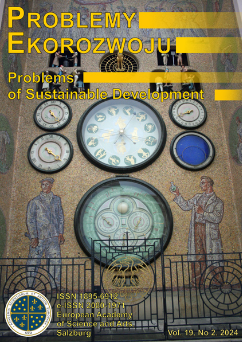Renewable Energy and Socio-economic Development in the European Union
Jelena Duran
Educons University, Vojvode Putnika 76, Sremska Kamenica 21208 (Serbia)
Mirjana Golušin
Educons University, Vojvode Putnika 76, Sremska Kamenica 21208 (Serbia)
Olja Munitlak Ivanović
Educons University, Vojvode Putnika 76, Sremska Kamenica 21208 (Serbia)
Larisa Jovanović
Educons University, Vojvode Putnika 76, Sremska Kamenica 21208 (Serbia)
Andrea Andrejević
Educons University, Vojvode Putnika 76, Sremska Kamenica 21208 (Serbia)
Abstract
The main objectives of the manuscript are the monitoring and measurement of economic and social development, as well as assessment of renewable energy development in EU countries from the perspective of sustainable development. EU STRATEGY 2020 has basic objectives related to energy development, which implies significant changes in overall development. Energy exploitation represents significant factor of economic, environmental and social development in separate countries, as in EU as a whole. The article will present sample methodology for energy strategy assessment, through analysis of basic economic, social and environmental indicators in EU27 countries. This research includes inter alia analysis of energy production in the EU27 countries, energy import dependency, quantity of pollution as result of energy production and consumption, and human development index (HDI). The countries with the greatest values of Total GDP (eg. Germany, France, United Kingdom and Italy) are positioned in the first ten countries in the total emission of CO2, SOx and NOx. The leading countries in the values of GDP per capita (eg. Luxemburg, Denmark, Sweden and Netherlands) have the middle values of pollution as result of energy production and consumption, except Luxemburg which is at the leading place. The relation between energy export and energy import in EU27 region reflects energy dependency in EU27 region and represents essential energy related problem. The country with the best export-import ratio is Denmark.
Keywords:
energy strategy, EU27, measurement, monitoring, RES productionReferences
AKELLA A. K., SAINI R.P., SHARMA M.P., 2009, Social, economic and environmental impacts of renewable energy systems, in: Renewable Energy no 34, p. 390-396.
Google Scholar
ALKIRE, S., FOSTER J., Designing the Inequality-Adjusted Human Development Index (IHDI), United Nations Development Pro-gramme Human Development Reports Re-search Paper 2010.
Google Scholar
BOOZER M., RANIS G., STEWART F., SURI T., Paths to Success: the Relationship Between Human Development and Economic Growth, Economic Growth Center, Yale University 2003.
Google Scholar
ĐURAN J., Economic Aspects of Investing in Renewable Energy in the Function of the European Integrations, Contemporary Issues in the Integration Processes of Western Balkan Countries in the European Union, International Center for Promotion of Enterprises, Ljubljana 2011.
Google Scholar
GOLUšIN, M., MUNITLAK IVANOVIĆ, O., 2009, Definition, characteristics and state of indicators of sustainable development in countries of Southeastern Europe, in: Agriculture, Ecosystems and Environment, vol. 130, issues 1-2, p. 67-74.
Google Scholar
GOLUšIN, M., MUNITLAK IVANOVIĆ O., JOVANOVIĆ, L., DOMAZET S., 2012, Determination of the Ecological-Economic Degree of Development in Countries of SE Europe – Weight Coefficients Technique, in: Problemy Ekorozwoju/Problems of Sustainable Development, vol. 7, no 1, p. 87-93.
Google Scholar
HOEDL, E., 2011, Europe 2020 Strategy and European Recovery, in: Problemy Ekorozwoju/ Problems of Sustainable Development, vol. 6, no 2, p. 11-18.
Google Scholar
HIDALGO C.A., Graphical Statistical Methods for the Representation of the Human Development Index and its Components, United Nations Development Programme Human Development Reports Research Paper 2010.
Google Scholar
KRONENBERG J., ILDA N, 2011, Simple Living and Sustainable Consumption, in: Problemy Ekorozwoju/Problems of Sustainable Development, vol. 6, no 2, p. 67-74.
Google Scholar
MICHAŁOWSKI A., 2011, Spatial Environmental Services in the Approach of the Assumptions of Economics for Sustainable Development, in: Problemy Ekorozwoju/ Problems of Sustainable Development, vol. 6, no 2, p. 117-126.
Google Scholar
MUNITLAK IVANOVIĆ O., GOLUšIN, M., DODIĆ S., DODIĆ J., 2009, Perspectives of sustainable development in countries of Southeastern Europe, in: Renewable and sustainable energy reviews, vol. 13, Issue 8, p. 2179-2200.
Google Scholar
PERIC M., ĐURAN J., The rise of alternative energy an attractive investment as the next sector, Proceedings Educons University of Social Sciences, University Educons, Sremska Kamenica, 2010, p. 347-357.
Google Scholar
RADOJICIC Z., ISLJAMOVIC S., PETROVIC N., JEREMIC V., 2012, A Novel Approach to Evaluating Sustainable Development, in: Problemy Ekorozwoju/ Problems of Sustainable Development, vol. 7, no 1, p. 81-85.
Google Scholar
UDO V., PAWŁOWSKI A., 2011, Human Progress Towards Equitable Sustainable Development – part II: Empirical Exploration, in: Problemy Ekorozwoju/Problems of Sustainable Development, vol. 6, no 2, p.33-62.
Google Scholar
Authors
Jelena DuranEducons University, Vojvode Putnika 76, Sremska Kamenica 21208 Serbia
Authors
Mirjana GolušinEducons University, Vojvode Putnika 76, Sremska Kamenica 21208 Serbia
Authors
Olja Munitlak IvanovićEducons University, Vojvode Putnika 76, Sremska Kamenica 21208 Serbia
Authors
Larisa JovanovićEducons University, Vojvode Putnika 76, Sremska Kamenica 21208 Serbia
Authors
Andrea AndrejevićEducons University, Vojvode Putnika 76, Sremska Kamenica 21208 Serbia
Statistics
Abstract views: 208PDF downloads: 101
License

This work is licensed under a Creative Commons Attribution-ShareAlike 4.0 International License.




